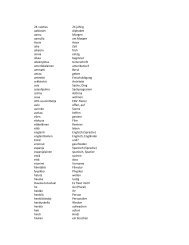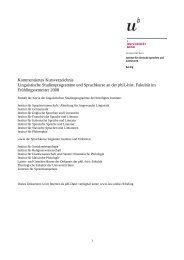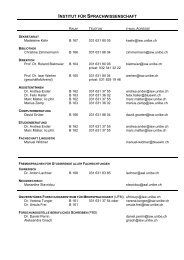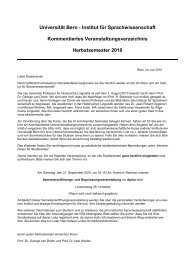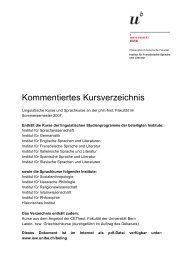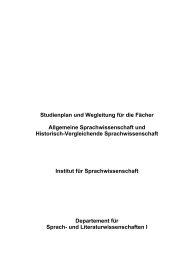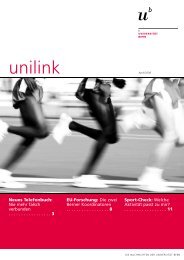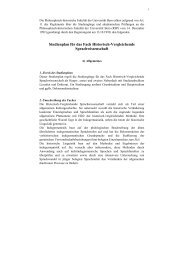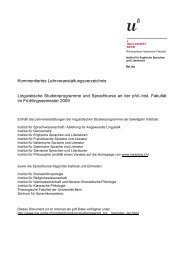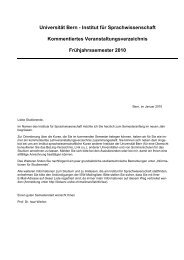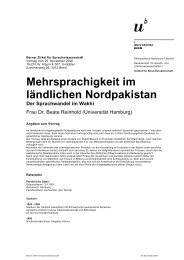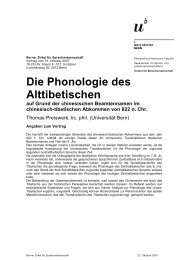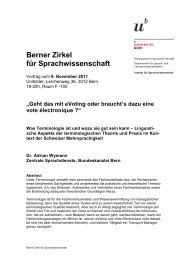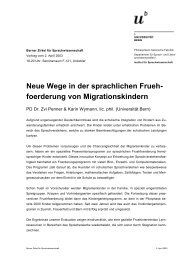- Page 1 and 2: THE EXPRESSION OF MODALITY IN KOREA
- Page 3 and 4: THE EXPRESSION OF MODALITY IN KOREA
- Page 5 and 6: 3.4. Evidentiality 164 3.4.1. Immed
- Page 7 and 8: ii III. General expository practice
- Page 9 and 10: iv These romanization conventions 1
- Page 11 and 12: 1 1. PRELIMINARIES One of the prere
- Page 13 and 14: 3 necessity as logical entities but
- Page 15 and 16: 5 of investigation, in this case a
- Page 17 and 18: 7 from being treated as utterances
- Page 19: 9 better (7) locutionary act: The s
- Page 23 and 24: 13 progressing on a linear path of
- Page 25 and 26: 15 with epistemic modality, in keep
- Page 27 and 28: 17 modality, we may „believe“ t
- Page 29 and 30: 19 1.1.3.4. Evidentials General soc
- Page 31 and 32: 21 (18) feiji nenggou qifei airplan
- Page 33 and 34: 23 (22b) I wish John were here now
- Page 35 and 36: 25 (Seoul), Ch’ungch’ong (betwe
- Page 37 and 38: 27 problematic in that they served,
- Page 39 and 40: 29 Brief mention of the Korean writ
- Page 41 and 42: 31 Korean verbal morphology shows n
- Page 43 and 44: 33 (31a) (31b) Yongho-ka uisa-ka to
- Page 45 and 46: 35 (32) MODALITY [SEMANTIC CONCEPT]
- Page 47 and 48: 37 distinction of mood and modality
- Page 49 and 50: 39 2.2. The verbal system of speech
- Page 51 and 52: 41 Table 3 characterizes the seven
- Page 53 and 54: 43 2.3.1.1. Indicative The indicati
- Page 55 and 56: 45 We thus find that the UFS follow
- Page 57 and 58: 47 marker of the UFS. One therefore
- Page 59 and 60: 49 Yet another specific aspect of t
- Page 61 and 62: 51 (49) kaul hakki-nun sae kwamok-i
- Page 63 and 64: 53 (52) [#[mok] V +o#] V # mok #
- Page 65 and 66: 55 likely, as street language in co
- Page 67 and 68: 57 communicative settings convey em
- Page 69 and 70: 59 While the insertion of the honor
- Page 71 and 72:
61 (63) top-si-o help-HON-MFS:SCSfx
- Page 73 and 74:
63 The resulting ambiguity in terms
- Page 75 and 76:
65 (70) oso o-se-yo quickly come-HO
- Page 77 and 78:
67 of two separate speech levels),
- Page 79 and 80:
69 2.3.2.2. Hortative The classific
- Page 81 and 82:
71 (78) [#[ka] V +si +p +si +ta#] V
- Page 83 and 84:
73 quite frequently in communicativ
- Page 85 and 86:
75 (85) [#[nol] V +se#] V # nol #
- Page 87 and 88:
77 i.e. an admonitive uttered in th
- Page 89 and 90:
79 (93) [#[mok] V +o#] V # mok #
- Page 91 and 92:
81 2.4.1. Systematic and functional
- Page 93 and 94:
83 Other types of modal semantic co
- Page 95 and 96:
85 Table 6 Intra- and inter-speech
- Page 97 and 98:
87 Finally turning to the morpholog
- Page 99 and 100:
89 l in the indicative mood type: [
- Page 101 and 102:
91 3. MODAL EXPRESSIONS 3.1. The co
- Page 103 and 104:
93 (101) Free Lexical Item minimal
- Page 105 and 106:
95 content compatible with this mod
- Page 107 and 108:
97 (106) Yongchol yonghwa kukyong-u
- Page 109 and 110:
99 The most common encoding in Kore
- Page 111 and 112:
101 (115) kongwon-ulo ka-myon coh-k
- Page 113 and 114:
103 (119) kongpu-lul cal ha-nun kos
- Page 115 and 116:
105 (124) i il-e-nun taetanha-n cos
- Page 117 and 118:
107 (129) no-nun cikum tton-a-ya ha
- Page 119 and 120:
109 (132) na-nun il ha-ci anh-umyon
- Page 121 and 122:
111 (1989), etc.) that modal ambigu
- Page 123 and 124:
113 even if we were to see this as
- Page 125 and 126:
115 (141) phyonci-lul nae-sy-o-ya h
- Page 127 and 128:
117 The face value of this instanti
- Page 129 and 130:
119 DE-4 hoka NV {(N) (V)} Deontic
- Page 131 and 132:
121 DE-8 kos cohul kos ita NVNC {(N
- Page 133 and 134:
123 DE-12 philyo NV {(N) (V)} Deont
- Page 135 and 136:
125 DE-16 su pakke opsta NNSV {(N)
- Page 137 and 138:
127 DE-20 SANC {(V-CSfx-Sfx) (AUX-
- Page 139 and 140:
129 Similar to the formally basic e
- Page 141 and 142:
131 (149) saengkak-khonte na-nun si
- Page 143 and 144:
133 and evidentiality, namely in ca
- Page 145 and 146:
135 (157) kulo-l su iss-o-yo be:lik
- Page 147 and 148:
137 (162) -l ADN:FUT -nun ADN:PRES
- Page 149 and 150:
139 a religious faith, e.g. hanu-ni
- Page 151 and 152:
141 (168) Pak sonsaeng-i samusil-e
- Page 153 and 154:
143 (171) kuroh-l li iss-o-yo be:su
- Page 155 and 156:
145 The characteristics of {(kos) (
- Page 157 and 158:
147 (178) oce soul-e pi-ka manhi w-
- Page 159 and 160:
149 3.3.3. Inventory EP-1 chuchuk N
- Page 161 and 162:
151 EP-5 cul alta NV {(N) (V)} Epis
- Page 163 and 164:
153 EP-9 kanungsong issta NV {(N) (
- Page 165 and 166:
155 EP-13 kos ita NC {(N) (COP)} Ep
- Page 167 and 168:
157 EP-17 li issta NV {(N) (V)} Epi
- Page 169 and 170:
159 EP-21 phantan NS {(N) (Sfx)} Ep
- Page 171 and 172:
161 EP-25 su issta NV {(N) (V)} Epi
- Page 173 and 174:
163 EP-29 uisim hal pa opsi NANV {(
- Page 175 and 176:
165 Following this statement, Ander
- Page 177 and 178:
167 difference does, in fact, lie o
- Page 179 and 180:
169 take on subtle semantic differe
- Page 181 and 182:
171 (189) hakkyo phae-tul-to ice-n
- Page 183 and 184:
173 EV-3 -tako hata SSA {(V-NSL:IND
- Page 185 and 186:
175 (191) otuu-n pam i-la-to pulkyo
- Page 187 and 188:
177 (196) kaelyang-ui yoci iss-o yo
- Page 189 and 190:
179 (199) heomchi-l chul-ul al-ko i
- Page 191 and 192:
181 DY-3 nunglyok issta NV {(N) (V)
- Page 193 and 194:
183 3.6. Volitive modality It will
- Page 195 and 196:
185 While {(cakcong) (i-ta)}, which
- Page 197 and 198:
187 (209) ku-nun po-nun kos-un motu
- Page 199 and 200:
189 means that an occurrence of [+k
- Page 201 and 202:
191 VO-4 -ko ca hata SVSA {(V-Sfx)
- Page 203 and 204:
193 VO-8 siphta V {(V)} Volitive MJ
- Page 205 and 206:
195 VO-12 yolmang hata NA {(N) (AUX
- Page 207 and 208:
197 (214) chil-yuk-i myos myong-i-t
- Page 209 and 210:
199 sense and certainly always leav
- Page 211 and 212:
(216) MODALITY MODALITIES MOOD PRIM
- Page 213 and 214:
203 which is important in a number
- Page 215 and 216:
205 compulsory system of speech lev
- Page 217 and 218:
207 following two examples illustra
- Page 219 and 220:
209 (220) i caek-un songkong-ui kam
- Page 221 and 222:
211 (225) co kuk kyong citae-e tulo
- Page 223 and 224:
213 realizations of the modal under
- Page 225 and 226:
215 4.3.2.4. Modal attitude The mod
- Page 227 and 228:
217 with lexical and grammatical ca
- Page 229 and 230:
219 The modal encodings for evident
- Page 231 and 232:
221 Based on this distributional da
- Page 233 and 234:
223 (241) ama na-ui chuchuk-ulo Cec
- Page 235 and 236:
225 concerned with how and to what
- Page 237 and 238:
227 types of modality are illustrat
- Page 239 and 240:
229 Brown, Penelope & Stephen C. Le
- Page 241 and 242:
231 Grice, H. Paul (1967) Logic and
- Page 243 and 244:
233 Martin, Samuel E. (1954) Korean
- Page 245:
235 Stephany, Ursula (1986) Modalit



